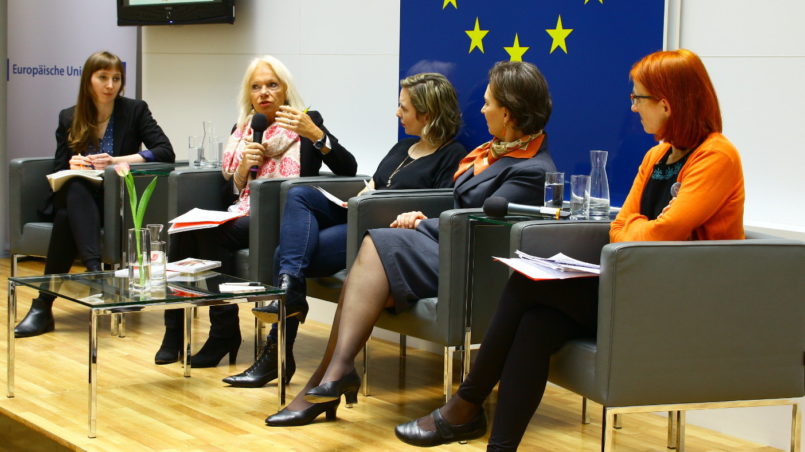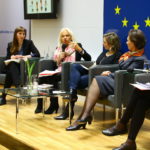Combating Domestic Violence – the Istanbul Convention

Event data
- Datum
- 8. 3. 2018
- Host
- Wiener Interventionsstelle gegen Gewalt in der Familie
- Location
- House of the European Union, Vienna
- Event-type
- Panel discussion
- Participants
- Kerstin Schinnerl, Wiener Interventionsstelle gegen Gewalt in der Familie, Allianz GewaltFrei Leben
- Gabriele Heinisch-Hosek, Obfrau des Gleichbehandlungsausschusses in Parlament, von 2013-2016 Bundesministerin für Bildung und Frauen (SPÖ)
- Gertrude Brinek, Volksanwaltschaft
- Elisabeth Klatzer, Wirtschafts- und Sozialwissenschaftlerin
- Rebekka Salzer, ORF, Moderation
In 2014 the “Council of Europe Convention for the Prevention and Suppression of Violence against Women and Domestic Violence”, also known as the “Istanbul Convention“, came into force. This international treaty obliges its signatory states – including Austria – to take effective measures to prevent violence against women and girls and domestic violence. On March 8, 2018, International Women’s Day, a panel discussion at the “Haus der Europäischen Union in Vienna”, entitled “A life without violence for women and girls”, dealt with the measures that have been taken in Austria since then.
Before the discussion, Kerstin Schinnerl from the “Vienna Interventionsstelle gegen Gewalt in der Familie” (Intervention center against family violence in Vienna) gave a short summary of the GREVIO report, which reports on the implementation of the Istanbul Convention in Austria and which is also meant to be a recommendation for action for the government. In her presentation, Kerstin Schinnerl noted that Austria is indeed a role model among the signatory states and that today’s Violence Protection Act, in particular, is regarded as exemplary internationally. However, the report also points to serious lacunae; above all, there is a lack of budget: at present, the Women’s Ministry in Austria has a budget of ten million Euro for violence protection and general gender equality measures at its disposal. The report recommends that at least ten percent of the costs which violence causes should go towards prevention, resulting in a sum of at least 210 million Euro for Austria.
The evaluation report, therefore, recommends a drastic increase in the budget of the Ministry for Women’s Affairs in Austria. There must also be a long-term strategy – an action plan to protect women from violence. The offers of support for victims of violence are also very different: there is already quite a good infrastructure for victims of domestic violence, but much less is done for victims of sexual violence; there are not even counselling centres in all Austrian provinces.
The evaluation report also contains recommendations on the prevention of violence; the perpetrators are often already known to the police, but too little is done for prevention. In addition, there are too few offers of assistance for female refugees; the GREVIO report recommends, for example, that gender-specific violence is recognised as a reason for asylum and that women seeking asylum be given access to women’s shelters.
The discussion which followed was also opened by Kerstin Schinnerl. She emphasised once again that Austria is on the right track among the states that are obliged by the Istanbul Convention to a better protection against violence.
I do not see the main problem in the laws, but in the political will and in the attitudes and convictions of society as a whole,
according to Schinnerl. All in all, violence within families is taken less seriously than violence by strangers, and the victims are often simply not believed.
Gabriele Heinisch-Hosek, the former Federal Minister of Education and Women in Austria and the only female politician on the podium, does not see the laws but their implementation as a crucial point. In any case, much more money is needed; the budget of the Ministry for Women’s Affairs in Austria has remained almost unchanged in recent years and has not been adjusted to the general increase in costs.
Even an increase in the penal framework, as is currently under discussion once again, would not help much if it were not accompanied by better victim protection and better preventive work with perpetrators in order to reduce repeat offences. In any case, much higher financial resources are needed than before: “We are already very good, but there is still a lot to be done in the protection against violence.”
The economist and social scientist, Elisabeth Klatzer, also considered the lack of money as the greatest problem, because the already tight budgets have not been increased for years and can no longer keep up with the costs:
We are in a situation that is actually intolerable. The structures are there, but if the money is missing, then it just doesn’t work.
She even fears a further significant deterioration in the financial situation and asks against this background: “How can we ensure that the insecurity for women does not increase massively?”
Gertrude Brinek of the Office of the Ombudsman in Austria pointed out that the lack of money is not the only problem. In her opinion, the prevention of violence must already begin in kindergarten by not conveying gender inequality. She also sees structural problems and cites as an example the assessment of the danger of potential perpetrators.
For example, the violent perpetrator who murdered a passer-by at the Brunnenmarkt in Vienna in 20161 was registered by the police and his dangerousness due to a mental illness was known. However, cooperation between the authorities, which might have made prevention possible, was prevented by data protection regulations.
Elisabeth Klatzer reported that it is not exactly clear how much money is needed to properly implement the Istanbul Convention and that the government does not even know how much money it needs:
Declarations and means are increasingly diverging, and that is a threat.
The places for the care of victims of violence are far from sufficient. Victims of violence who have fled to women’s shelters are predominantly in a very poor financial position and need more practical support, for example in order to receive training or to have better opportunities in the labour market. The economist and social scientist is of the opinion that, “We are still very much at the beginning”.
Heinisch-Hosek reported from her political experience that it takes a lot of energy to push through women’s issues politically: “The anchoring of sexual harassment in criminal law was a feat of strength,” she claimed in reference to paragraph 218 of the Criminal Code in Austria concerning sexual harassment and public sexual acts.
Ombudswoman Brinek pointed out that actually, an ongoing legal adjustment process would be necessary. The Office of the Ombudsman in Austria makes suggestions for legal improvements. For example, the resocialisation of violent offenders, including therapy, is a very important part of prevention of violence, because a significant part of the violence is committed by repeat offenders.
Kerstin Schinnerl considered the increase in the penal framework for crimes of violence as absolutely not a priority. Rather, the existing possibilities in the legal process must be exhausted. Many perpetrators are not convicted at all; for example, only about seven percent of all criminal charges of rape actually lead to a conviction of the perpetrator. Schinnerl pointed out another problem in the choice of words in media reports, where often trivialising terms such as “family tragedy” are used.
All in all, the participants in the discussion – all female – largely agreed that the laws currently in force in Austria to protect women and children from violence within the family are quite positive. The problem is above all, however, their poor implementation; in particular, the poor financial resources of the institutions for aid for victims of violence, but also the structural problems due to the insufficient cooperation between various authorities have been criticised on several occasions.
Translation German-English: Anna Dichen
_
1 https://www.thelocal.at/20160506/police-hold-crisis-talks-on-after-brutal-murder-in-vienna
Credits
| Image | Title | Author | License |
|---|---|---|---|
 |
00_VA_Istanbul-Konvention_Martin-Krake- | Martin Krake | CC BY-SA 4.0 |
